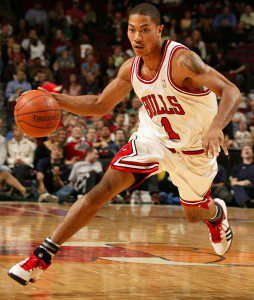The Chicago Bulls won Game 7 of their First Round match-up against the Brooklyn Nets without Luol Deng, Kirk Hinrich and of course Derek Rose; and not to mention center Joakim Noah played with plantar fasciitis and dominated. Now that the Bulls face League MVP LeBron James and the Miami Heat in the Second Round they will need everybody healthy; including Derek Rose.

Rose has been medically cleared for close to two months now and is claiming that his muscle memory hasn’t returned. But the question is, have athletes like Minnesota Vikings running back Adrian Peterson pressured players like Derek Rose to recover faster?
Vikings running back made a historic recovery from his major knee injury and made the Vikings starting lineup for Week 1 of the 2012-2013 season. Peterson was able to put up a historic season statistically, falling just nine yards short from the NFL Single Season Rushing record, making people wonder if the bar was raised for recovery and performance for future players coming back from a serious knee injury. Western New England University’s Athletic Trainer Erin Cloutier however, disagrees.
“Adrian Peterson did set a high standard, but I don’t believe that every athlete should strive to rush back at the rate he did,” said Cloutier. “Every injury is different. Every athlete is different. A lot of factors are going to come into play when you’re talking about the recovery rate, if they had any prior injuries, what their conditioning level was at before getting injured.”
Even though Rose credits the lack of muscle memory to his slow recovery, Orthopedic surgeon at Mercy Medical Center in Springfield, MA Dr. Leonard Wagner believes that Rose’s slow recovery is due to a variety of reasons.
“Part of all of this has to do with not only the development he can work on but in actuality how long does it take for this to really heal. Because when you do this operation the most common and the gold standard would be to get bone to heal to bone with the ligament in between and that has to do with the really the healing of the bone.,” said Dr. Wagner
“So you could think everything’s great but in actuality there’s not enough time for that particular thing to heal which you don’t have much control over. Although I’ve had people return to competitive sports in high school and in college at five months, six months, the earliest was four months… The end result of all of that is the thought is it really takes up to a year to get this actuality to heal,” Dr. Wagner continued.

Recently there have been multiple serious knee injuries in major American sports, from Peterson and Rose to Washington Redskins quarterback Robert Griffin III and Boston Celtics point guard Rajon Rondo. As frequent as these injuries may seem, the multitude of all of them are more fluke than anything else according to Dr. Wagner.
“I think part of it is, that the public becomes a little bit more tuned in and these are high profile players,” said Dr. Wagner. “People have been tearing out there ACLs for a long time and have been having them fixed.”
As these injuries become more frequent it’s important to remember that everybody is different and reacts differently to injury. Even though Adrian Peterson is an example of a successful recovery from a major knee injury he is not necessarily a template for players to model their rehabilitation after when trying to make a comeback.
“Yeah it’s tough to say that because every athlete is different. Nobody is going to heal like somebody else,” said Cloutier. “You can have an ACL injury in one athlete and an ACL injury in another athlete and they can be completely different.”
Do you think it’s time for Derek Rose to come back?

